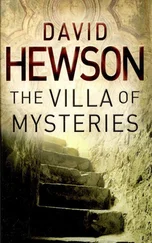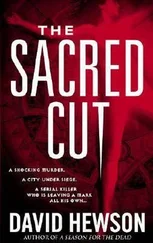That man had danced with the Devil, though a part of him had yet to face up to the fact.
A little giddy from the wine, Piero found his gaze wandering, across the lagoon, to the city waterfront, and that long monotonous stretch of tall buildings running from Celestia to the Fondamente Nuove. He read the papers avidly each day. It was important to be informed. They carried much on the rise of Hugo Massiter, and how the Englishman had great plans for the Isola degli Arcangeli. They carried a little, though not too much, about the aftermath of the tragedy in the palazzo, an event he might have witnessed had he not delivered his cargo that evening, then made himself scarce as quickly as possible, anxious to get away from the peacocks and painted ladies pouring onto the island.
The troubled inspector now lay somewhere in that complex of buildings on the distant waterfront. Piero wondered whether the man had met his own personal demons in his sleep, and which of them would win if such a confrontation occurred.
“A man cannot outrun himself,” he said, aware of a slight slur in his voice, one that came from a plastic cup too many of the heady dark wine he’d extracted from the previous year’s crop of Sangiovese, Oselata and Corvina vines that grew like tortured serpents in the dark earth by the sea.
Everything moves to meet its fate, he thought. All that changed was the pace, the speed at which one closed upon the final meeting.
His head swam. He wanted to give the dog another chance at the tiller, to point the vessel across the lagoon at the distant island, with its iron angel, for the last time, a burden he would never have to inflict upon Xerxes again.
Then something caught his attention. A water taxi, long, sleek and polished, rounding his corner of Sant’ Erasmo, opening up its powerful engines, lifting its nose above the grey lagoon, speeding back towards the city.
No one ever used those boats on the island. They didn’t have the money. They didn’t have the need.
Puzzled, he thought about the Sophia ’s decrepit, puny engine, so weak it could scarcely keep up with the trash boats that trundled garbage from the city to dump on some distant destination at the lagoon’s periphery.
He watched the water taxi’s silhouette diminishing with speed in the distance, and wished he could match a quarter of its speed. Piero Scacchi knew he had to see the Isola degli Arcangeli one more time, and then be done with the place for good.

COSTA WAS STILL ON THE PHONE WHEN THEY MOORED at the San Pietro vaporetto stop. The roar of the reversing diesel sent a flock of startled pigeons rising into the perfect sky. He gave the taxi owner a hefty wad of notes, then stepped ashore, fixing his eyes on the crooked campanile ahead of him, wondering how to reach it through the warren of solitary alleyways spreading out from the waterside. Even here, on this deserted island only just attached to the main bulk of Venice, it was impossible to escape the city’s drive for power. Until two centuries before, the sprawling hulk of San Pietro had been the city’s cathedral, a symbol of the Church which the State exiled, quite deliberately, to the distant periphery to make sure no one, not priest nor congregation, was in any doubt that the spiritual must always give way to the temporal. Today, what little power the area had once possessed was entirely dissipated, blown away like pollen on the wind. Deserted save for a few pensioners enjoying the sun on the sparse green grass in front of the cathedral, it seemed an appropriate place to plan the final act of a conspiracy.
He’d called each of them as he made his way across the lagoon. Teresa Lupo, who had now given up watching Leo Falcone sleeping in the Ospedale Civile. She felt content about Falcone. He wouldn’t stir for a while. But the surgeon she’d brought in to manage his case assured them he was out of danger, not that she’d needed his opinion. On the phone, her voice difficult to hear over the noise of the taxi battling across the lagoon, she’d told Costa how she’d seen the fire in Falcone’s eyes as the sedative fought, and won, the battle to put him to sleep. There might be difficult times ahead, but Leo would return to the fray, and keep on returning until something stopped him for good.
It was a quiet, pointed rebuke about Costa’s own position, perhaps, but one he’d little time to consider at that moment.
Gianni Peroni would, he felt sure, still be furious after a brief and ill-tempered episode at the big Questura in Piazzale Roma. In desperation, and against Costa’s advice, the big cop had made one last effort to persuade some individual above the head of Commissario Grassi that the murder of Randazzo could only be investigated properly if it was seen in the light of the Bracci case and, by implication, that of the murders of Uriel and Bella Arcangelo. It had been like screaming at the deaf. Peroni hadn’t got beyond the pen pusher at the desk, who’d made one call, to a name he didn’t recognise, then told Peroni the station was too busy to waste time on someone who no longer worked there.
Luca Zecchini had pleaded the need for some time to himself. It took a while for Costa to get through to the major directly on his mobile. Zecchini was circumspect, unwilling to talk. The Carabinieri had an office not far from the Castello Questura, in the Campo San Zaccaria. It wasn’t hard to guess what Zecchini would do next. Exactly what any safe, conventional officer would in the circumstances. Call back to base, explain the situation to a superior, await orders. Prepare to share the blame. A content, well-ordered man like Zecchini surely believed that only an idiot would stick his neck on the block without good reason. The major had gone a long way already, all on the basis of a brief personal friendship with a man from a rival force. Further than Costa had expected, in all honesty. From the short conversation they had, one in which Costa struggled to persuade him to come to the meeting on San Pietro, it was difficult to gauge how much more Zecchini, or his superiors, could accept.
And then, finally, Costa had phoned Emily, left a message, since she was on voicemail, and received a brief call a little while later, during which she promised to do little more than be at the cathedral as he asked.
There was no time to wonder about the hesitation in her voice, no time for anything but to try to devise a way ahead. It was now almost five p.m. The Isola degli Arcangeli would be signed away to its new fate in little over an hour.
COSTA LOOKED AHEAD and saw a slender figure in a dark silk suit standing half hidden by the side of the crooked white marble campanile that leaned at an odd angle, set apart from the cathedral to which it belonged.
“Where have you been?” she asked bluntly.
“Chasing ghosts.”
“Did you find them?”
This wasn’t the conversation he wanted just then.
“Not exactly. It was a stupid idea, probably. I don’t think Leo would have approved.”
Emily looked at the wound on his head. Laura Conti had bandaged it. He could feel that the dried sticky blood had made its way beyond the fabric.
“You’re hurt, Nic.” Her hand went to his hair, her eyes examined the blow. “Head wounds can be nasty. You should see a doctor.”
“Later. We don’t have time.”
“Don’t we?”
He hadn’t seen her look like this before. Her eyes no longer shone. Her face had a flat, emotionless cast that made her seem older, sadder.
“And you?” he asked.
“I’ve been trying to get you what you want.”
“I know. Thanks.”
Читать дальше













